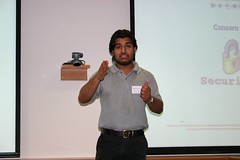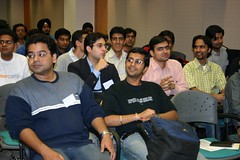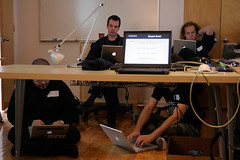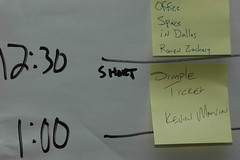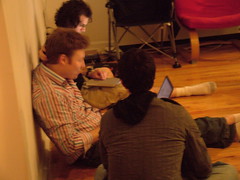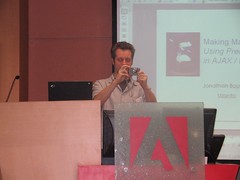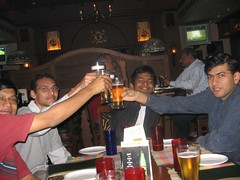Thursday, March 30, 2006
Tuesday, March 28, 2006
"Le" Age
we have now entered into the era of “LE”. While some might argue that flickr's success has made "kr" is the Official Suffix of Web 2.0, I disagree. After Google’s phenomenal success, there’s been an influx of companies wanting some "le" magic.
Monday, March 27, 2006
Get your Fouls
If Alan Iverson fouled out in the first ten minutes of an NBA basketball game, you can be sure that his coach would immediately talk to him because he was playing too aggressively...and "urge" him to play it a little safer. However, if Iverson played several games without getting any fouls, Van believed that a good coach should also talk to him -- because he was playing too safe...and "urge" him to take more chances and be more aggressive.
Quote
you think deeply and find satisfactory answers to these questions, go ahead."
Chanakya quotes (Indian politician, strategist and writer, 350 BC-275 BC)
Sunday, March 26, 2006
Escalating Appeals
1. The Personal Request – Do it as a favor to me. I’ll owe you one.
2. The Ego Protection Ploy – You’ll look bad in the eyes of others.
3. The Team Play Appeal – It’s important to the team.
4. The Fun Promise – You’ll enjoy it once you start doing it.
5. The Isolation Gambit – You don’t want to be the odd person out.
6. The Guilt Plea – You’re a better person than that.
7. The Values Volley – It’s consistent with what you believe in.
8. The Perspective Point – It will pay off for you in the long run.
9. The Have Mercy Message – Other people will suffer if you don’t.
10. The Contractual Comeback – You agreed to this when we discussed it.
11. The Principle Principle – It’s the right thing to do.
12. The Context Framer – When you do this, it has the following consequences for others.
13. The Achievement Temptation – You could get good at this if you wanted to.
14. The Recognition Response – People will really think highly of you if you do this.
15. The Desperation Resort – Do It and We’ll Pay You (We promise.)
1/12/14...Have been most successful for me...:)
Thursday, March 23, 2006
Staying ahead of the curve
Community how? = blog is a big part of that as are other blogs, delicious tags, and a host of other resources on the web.
Online Banking in India
December 2005 study by the Internet & Mobile Association of India (IAMAI) and Cross Tab Marketing Services, says that an estimated 4.6 million Indian Internet users currently bank online and that the number is expected to cross 16 million (inclusive of Internet and mobile banking) by 2007-08.
Online banking user traits
* 60% had relationships with 2-3 banks while 59% have 2-3 bank accounts
* 25% users were in the age group of 18-25, 43% in the group of 26-35, 19% (36-45 years), 10% (46-60 years) and 2% (61+)
* 83% are males; 17% are females
* 41% access their online banking account from home
* 51% cited convenience as the most important factor to bank online
* 38% said that they liked the facility of checking bank balances and statements online
* 45% operated their online banking accounts on weekdays and weekends; 17% use online banking between 6-9 pm and 15% between 9-12 pm
Source: Business Standard
Via: Venture Intelligence
Dont lie to yourself - Blog Maverick
Excerpts from the same:
The same applies to business people and particularly to entrepreneurs and want to be entrepreneurs. We tend to be less than honest with ourselves about our strengths and weaknesses.
I have been just as bad at this as anyone, particularly when I was getting started in the business world. For those of us who dream of starting and running a business, we know that we have to have a level of confidence in our own abilities. We dont want to believe that there are things we cant do. We want to believe that if we try hard enough, work long enough, and get a little lucky, that the sky is the limit. The problem is that we let our confidence cloud our judgements of what we truly know about ourselves.
Im one of the least organized people I know. Today, i have an assistant and others that help me run my life. If you ask me where IM going to be in 3 days. I have no idea. I do know that i have a kick ass assistant who is going to make sure that when i wake up that morning, I know where Im going and how to get there.
Wednesday, March 22, 2006
Computing ...Going the Electricity approach.
Brad very succintly explains the same here ....excerpts below
Many years ago, I read an article that made a big impression on me. It compared the adoption of information technology to the adoption of electricity. The article noted that, in the late 19th century, when electricity was a novelty, it was a quirky, visible, high maintenance presence in the lives of those adventurous enough to embrace it. When electric motors were first introduced in the household, they were bulky units that most often sat on a big stand in the front hall. The motors powered a belt that turned a shaft mounted over head. Appliances like washing machines were also connected to the shaft by belts. The system was inherited from manufacturing operations that had been powered by water wheels prior to electricity. The proud owners of these early systems would show them off to all their friends, but they also had to be willing to get their hands dirty greasing the shaft, replacing the belts and rebuilding the motors.
The author of the article argued that the information technology business was then in the same stage of development. [I should be pointing to the article, but I don’t remember its title, author or publication - so my web search did not find it.]
I do remember, however, thinking that the article was on to something. Information technology was, at the time, proudly displayed in a glass houses with raised floors. Anyone brave enough to use it in their daily lives had to be willing to maintain it themselves. I also felt certain that there would be a day when, it would be come as invisible to us as electricity. We would stop proudly displaying the infrastructure of IT, and would eventually be blissfully ignorant of how it worked and even who provided the basic infrastructure. How many of us know which national conglomerate owns the local utility that delivers the amps to our home?
Technologies importance in Start ups
We contacted about 75 key venture capitalists, entrepreneurs, press and analysts and asked them – with a short survey – what they thought. We got an extremely high response rate; it turned out that almost everybody was interested in the topic, and in sharing their opinion. A number of people commented that the question was provocative to them because no one else seemed to be asking it.
And, as it turned out, nearly everyone was still interested – very much so – in technology as a crucial asset to start-ups. You can look at the data yourself – a summary report can be found here. But let me give you the bottom line: 91% of the respondents believed that unique technology is “usually” to “always” crucial to the success of start-ups. We asked a half-dozen additional questions, trying to ferret out why they thought it was important (for competitive positioning, for higher valuations, etc. etc.) and the report will also tell you that. But that 91% was a surprise, given the vibes I was feeling, and to me, the results were quite pleasing.
I was pleased because we have always felt that unique, cutting-edge technology is a defining characteristic of those companies that truly and dramatically improve our lives in some way, and that such companies usually have the makings of the best, most successful, and most interesting start-ups. Certainly other factors matter – a lot. But technology is at the heart of a start-up company’s leadership. I was also pleased to see – and to be able in turn to share with entrepreneurs and those that make up their ecosystem – that creating new ideas and unique approaches – often from the ground up – continues to matter – very much.
via Venture Blog
Sunday, March 19, 2006
MS Project Training - Chennai
Wednesday, March 15, 2006
Something Different!
Thanks to Jarvis who pointed me to Dave Weinberger who pointed me to:
Ian's Shoelace Site. I am now tying my shoes differently.Not because the laces used to come undone (they did, but not anymore... I use method 2 now) but because the act of starting every single day doing something that feels so different is a great subconscious reminder to reject the status quo.
And an even better reminder that the chances that 4 year olds will be taught this better way any time soon is pretty tiny. Good ideas spread, but old ideas stick around.
[Via Seth's Blog]
Be the Star of Your Business
By Jeff Burrows
Faculty Member, Trump University
If you're running your own business, you had better cast yourself as the star of the show. Too many entrepreneurs waste their time playing every supporting role from sidekick to understudy.
[Via The Trump Blog]
Tuesday, March 14, 2006
The end of boredom
Portable media devices, whether Ipods, portable gaming devices, phones with all their features, or whatever have
solved what has been a generations old nuisance for all of us, boredom.
We have our little devices and now we are never bored. We dont find ourselves staring off into space unoccupied,
wondering what to do. We dont find ourselves muttering about how bored we are sitting on the train, or on a plane,
trying to do anything to make the time go by more quickly.
Our little mobile devices are so popular because they are the ultimate, continuous distraction. They are the easiest
cure for boredom.
Check your email. Call your friend. Play a game on your phone or PSP. Watch a movie on your Ipod. It doesnt matter
where you are anymore. You always have at least one.
When we leave the house now, its keys, wallet, phone/pda/IPod, lock the door. The minute we have nothing
better to do, or our mind starts to wander, regardless of where we are, meetings, events, elevator, exercise bike,
walking down the street, out it comes.
When we have to do something that we want to go by quickly, like those 45 mins on the bike. Out it comes. You dont
care how big the screen is, you just want to be distracted…and maybe catch up on your favorite show or watch the
video of the kids soccer match
We are going to become increasingly dependent on these devices not because we think they are amazing or wonderful,
but because they are there. They do their job. They distract us.
Portable video will be successful not because it will siphon off viewing from traditional tv. Portable video sells
and will sell in increasing numbers because its a better cure for boredom, and a better distraction than just music, or
just a phone, or just games.
Daydreaming and zoning out arent dead and gone, but they now have a soundtrack and a video
[Via Blog Maverick]
Web 2.0 - Profitability?
So what could be the model? One that I am beginning to develop some conviction for is towards experiences so far in monetizing high affinity communities. In an offline model, we already have experience in monetizing a Harley Davidson club, or Rotary, and so on. Some thoughts basis that:
1) The key to these communities is not the size (the key to “enabling technologies”, such as tagging, will be size), but sharpness.
2) Once you have sharpely focussed communities, what you sell on top of them has to be much higher value than adwords. Amazon’s expected “Productsense” model could be one, as also the ability to “click-to-talk” enabled by VoIP providers. Affinity driven products and services would be the key, and relevance will need to move far beyond adsense.
3) Think of this — if you had a community of Harley fans online, what would you sell to them? and how can you now take that example, and generalize the technology? I think seeds of those enabling technologies are beginning to emerge today.
4) Due to high concentration of value, the enabling businesses will not all be automated — especially, the part where “relevance” gets captured (the hosting part may be automated, as a contrast). Tagging is an example.
5) I still think there will be a mix of “interest-centric” and “user-centric” communities, and hence the ability to “follow a user” across interests could be another possibility — this is same as trying to derive user profile from content being browsed. The current intent-based-paradigm will get far sharper, and/or evolve into user-based-paradigm.
6) High affinity should imply lower customer acquisition costs, though that by itself might not be an exit driver.
So the problem to be solved is
a) What creates high affinity communities on the web (I do not think the early experiments in Web 2.0, such as myspace, are the answer)
b) How does one maximize value per member with sharpely focussed communities
[Via VentureWoods]
Monday, March 13, 2006
Innovation
Update: Sreedhar thanks a lot for the comment i finally came around to reading that document by bagchi it was great, i think i will need to read it a couple of times before i understand every nuance of it.
Announcing BarCamp Chennai Ever since I heard ab...
Announcing BarCamp Chennai
Ever since I heard about the original BarCamp that happened in Palo Alto and later in New York City, I've been yearning for such an event since last November. I've been thinking of putting together an unconference for quite some time. The turning point came after seeing the success of Delhi BarCamp. I decided to scratch the itch. I put together initial plans and it quickly gathered momentum. It's definitely the most exciting event I'm planning up along with some uber cool folks.
Check out this Wiki on BarCampChennai for full information.
BarCamp is an ad-hoc unconference born from the desire for people to share and learn in an open environment. It is an intense event with discussions, demos and interaction. The two day BarCampChennai focusses on Web 2.0 and Next Generation Internet. It takes place on April 8th and 9th (Saturday and Sunday)
It's an open, welcoming, once-a-year event for geeks to camp out for a couple days with wifi and smash their brains together.
The event will be free or very close to free. But there's a catch! Every participant *MUST* participate actively. "Active participation" might mean giving a presentation, helping with a presentation, helping in organizing, blogging or podcasting the event, or whatever other creative ways to contribute people can come up with.
There is no audience. Only participants! This is unlike any conference you have been to before. It's new, it's different. Anyone with something to contribute or with the desire to learn is welcome and invited to join. Visit the Wiki, and just add in your name and your presentation title. We are actively seeking volunteers. There are lots of ways one can contribute. Just take it up and let's colloborate together.
There's already lots of interest brewing. There are participants coming in from as far as Delhi and Mumbai. If you are technology aficionado interested in Web 2.0 and the next generation of Internet, don't miss this. Join in and let'd do this together. Visit the BarCampChennai Wiki and add yourself.
Here are a few snapshots from BarCamps around the world.
[Via Kiruba.com]
Thursday, March 09, 2006
The Value of Vision
Competition for the future is competition to create and dominate emerging opportunities - to stake out new competitive space. Creating the future is more challenging than playing catch up, in that you have to create your own road map. The goal is to develop an independent point of view about tomorrow's opportunities and how to exploit them. Pathbreaking is a lot more rewarding than benchmarking. One doesn't get to the future first by letting someone else blaze the trail.There is not one future but hundreds. Getting to the future first is not just about outrunning competitors bent on reaching the same prize. It is also about having one's view of what the prize is. There can be as many prizes as runners; imagination is the only limiting factor. In business, as in art, what distinguishes leaders from laggards, and greatness from mediocrity, is the ability to uniquely imagine what could be.
[Via Emergic]
Tuesday, March 07, 2006
Ram Shriram, John Doerr, Ray Lane presentations in Bangalore
The TiE Bangalore chapter has made the presentations made by angel investor Ram Shriram and KPCB's John Doerr and Ray Lane at its "Entrepreneurship - yesterday today and tomorrow" event on January 31 availble for download from its web site.
Relationship Capital: John Doerr
Consumer Internet Web 2.0: Ram Shriram
KPCB in the Software Industry: Ray Lane
Arun Natarajan is the Founder of Venture
[Via Venture Intelligence India]
Essence of Leadership - Robert Altman
Mr Altman won the lifetime achievement award at the Oscars last night. I loved this from his acceptance remarks, and I paraphrase: "The role of the Director is to create a space where the actor or actress can become more than they've ever been before." (Or, maybe: "dreamed of being." Better yet. I'll have to find a transcript.)
To me that's the essence of leadership—in any context.
Posted by Tom Peters |
Comments?
[Via The Tom Peters Weblog]
Searching across multiple desktops
Brandon talks about how to search across multiple PCs here:
...you should try Windows Desktop Search combined with the free FolderShare application.� With FolderShare your data remains safely on your PCs, but you can search, browse, and access your data from any internet-connected PC.� FolderShare added search integration with WDS last summer.� They were acquired by Microsoft a few months ago and the product was made free at that time.
Sounds like a more palatable solution than the one discussed here...�which is frightening to me:
"If you use the Search Across Computers feature and don't configure Google Desktop very carefully—and most people won't—Google will have copies of your tax returns, love letters, business records, financial and medical files, and whatever other text-based documents the Desktop software can index. The government could then demand these personal files with only a subpoena rather than the search warrant it would need to seize the same things from your home or business, and in many cases you wouldn't even be notified in time to challenge it. Other litigants—your spouse, your business partners or rivals, whoever—could also try to cut out the middleman (you) and subpoena Google for your files."
Hey.... I'm just sayin'!
[Via Torres Talking]
12 Steps to Immersion in a Topic of Interest
I've been thinking lately about how to get the students I mentor to really dive head first into their interests. Schools don't really teach students the degree to which they need to fully research and follow a topic enough to form opinions, discover opportunities, etc. In other words... how to throw gas on the fire in their bellies. Here's a 12 step list that I think can be helpful to fill out and follow:
We'll use digital media as an example.
- Define. We're talking television, radio, music, movies, etc. and all of the screens and speakers it can wind up on.
- Follow the money. Creative people are paid to produce by publishers who pay distributors to send the content to consumers, who either pay directly for it or are subsidized by advertisers. (Oversimplified and changing of course, but its a start...)
- Stakeholders. Who's involved? Creatives, consumers, publishers, advertisers, distributors (channels, stations), big media, new media, investors, analysts, researchers, academics, the government.
- Mainstream media. Read the newspaper. Watch the news. Read books on this topic. What's your digitial media reading list look like for MSM?
- User generated content. Read blogs: Paid Content, Rebuilding Media, etc. Message boards, listservs. Make a list of the places you can get insider and alternative info.
- Participate. Comment. E-mail. Share your thoughts with smart people and listen to them. Go to conferences and speaking engagements.
- Record. Keep a blog about following digital media, what you're learning and what you think about it.
- Network. Join LinkedIn. Write a bio. Invite people you know and search it. Do some informational interviews and stay in touch with the people willing to share time with you. Keep these people in a PDA, Outlook, wherever you keep contacts and a calendar to remind yourself how often you want to talk to people.
- Visit. Don't just sit at your computer. Try to visit some companies in the space or other repositories of knowledge on the topic in person.
- Associate. Join a professional society or social networking group related to digital media. (Like nextNY of course!)
- Know the issues. Look into DRM, privacy, the disaggregation and reaggregation of content. New business models and Exploding TV.
- Experience. Seek out a job or project in this space. Use Indeed!
[Via This is going to be BIG.]
Monday, March 06, 2006
Sleep less. Live more
IT ONLY TAKES A MINUTE
It only takes a minute to tell a loved one you adore them
It only takes a minute to run towards a fear
It only takes a minute to set a big goal
It only takes a minute to drink a glass of water
It only takes a minute to read a great idea (that just might rock your world)
It only takes a minute to write the most beautiful thank you note you have ever sent your parents (or a teammate or a customer or a high school teacher who blessed your life)
It only takes a
[Via Robin's Blog]
Seven CEO lessons for the new year from the fall of former CEO's Fiorina and White.
The omnipotent leader sets a deluded company course.
Minding the company's culture is one of the CEO's most important responsibilities.
Even the "friendliest" board of directors will eventually turn on their superstar CEO.
The sales and marketing oriented CEO needs a COO.
Your biggest enemy is not your true enemy.
Failure is never final.
Source: 1
Quote
Saturday, March 04, 2006
New And Exciting Stats
I love stats (also know to serious people as “analytics.”) In the past, I’ve written about the variety of stats packages I use and track regularly (e.g. at least daily.) Today, FeedBurner came out with an upgrade to its stats that add a number of new things, including uncommon uses, the concept of “reach”, and item popularity. Mike Arrington at Techcrunch has a comprehensive post up with screen shots - rather than repeat this here, I’ll simply point you there to take a look.
- FeedBurner: Core RSS feed and page view metrics
- AWStats: Core page view metrics
- Google AdSense: Page views by channel, ad click throughs
- Amazon: Online purchase metrics
- Bloglet: Email subscribers
- MyBlogLog: Outbound link tracking
- MeasureMap: Inbound / outbound link tracking (in alpha)
- Technorati: More link tracking
- Feedster: Even more link tracking
Here’s the new list as of today:
- FeedBurner: Core RSS feed, page view metrics, item views, reach, and email stats
- BlogBeat: Core page view metrics (plus feed data via integration with FeedBurner API)
- Google Analytics: Page views
- Amazon: Online purchase metrics
- MyBlogLog: Outbound link tracking
- Technorati: More link tracking
I’ve dumped the others for the following reasons:
- AWStats: Stats weren’t telling me much
- Google AdSense: Google Analytics (and now BlogBeat) gives me much better data
- Bloglet: I dumped Bloglet and use FeedBlitz, which has stats integration with FeedBurner
- MeasureMap: Slow, wrong data, and now part of Google (hence I expect integration into Google Analytics someday)
- Feedster: Increasingly irrelevant / redundant data
Yes – less is more in this case (since I’m getting a lot more data from the services I’m using as they evolve.)
[Via Feld Thoughts]
Wednesday, March 01, 2006
Chatting in my inbox
So, at first, Gtalk was underwhelming.
But, integrated into my Gmail inbox, I've been using it all day... but in a different way than I use AIM. I've noticed that, when someone sends me an e-mail, and they're online, its a quick way to ping somebody right back--because they're still in the inbox. Its very task oriented, whereas AIM is more conversational.
Anyone else feel the same way? Differently? Have you used it more now?
[Via This is going to be BIG.]



